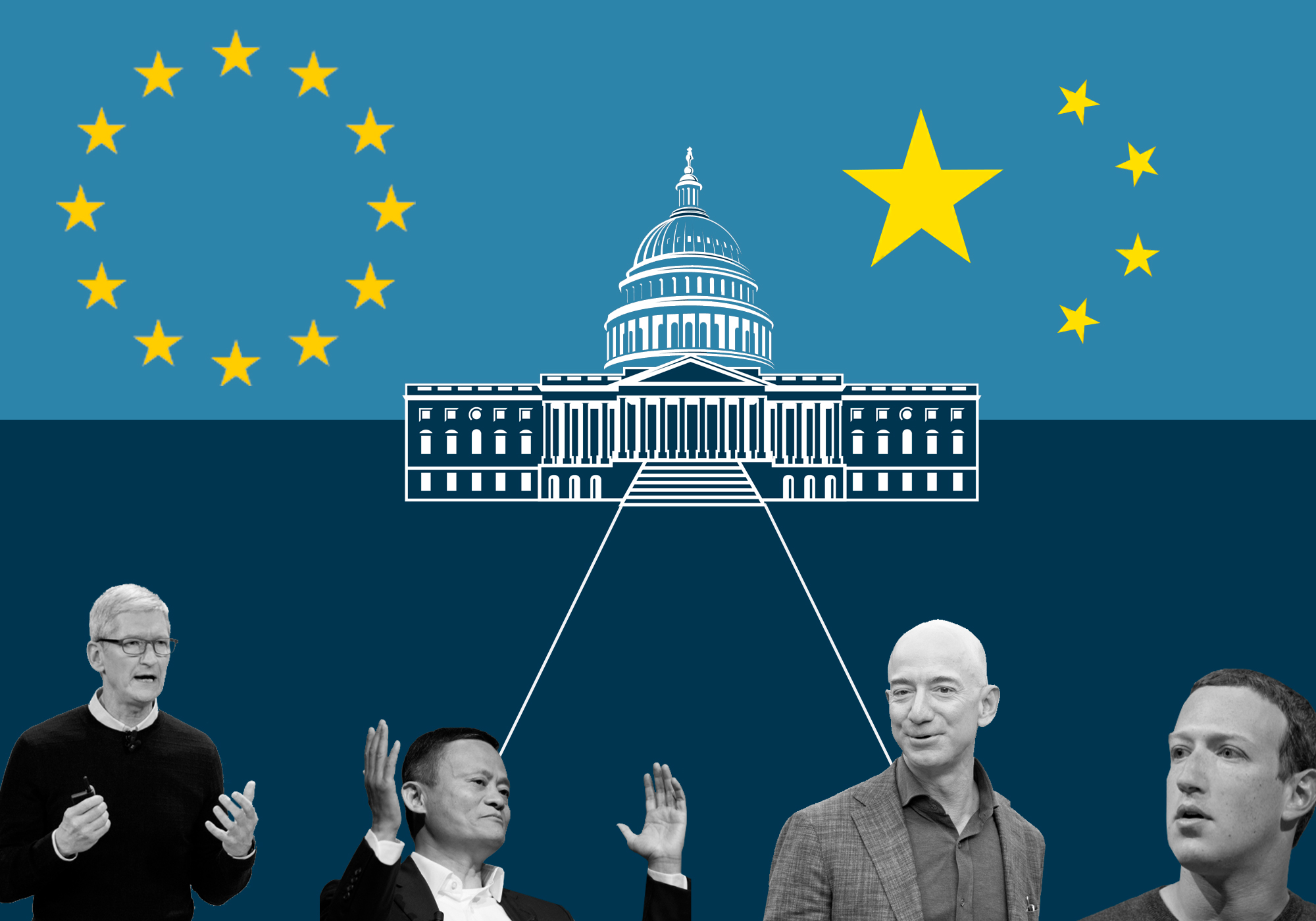The world is currently witness to a major regulatory offensive against the so-called Big Tech companies. These companies, which deal in technology-based products and services, are synonymous with high market capitalization and have a huge impact on the habits and behaviors of a growing part of society.
After many years of prosperity and favorable regulatory winds, companies such as Facebook, Google, Amazon, Apple, and Microsoft in the United States; and Baidu, Alibaba, Tencent, ByteDance, and Didi in China, are now finding that the eyes of their respective governments are on them – as are those of the European Union, for example, which has spearheaded this type of regulatory scrutiny.
In a matter of weeks, the Chinese government has imposed a series of fines and restrictions that have wiped billions of dollars off the market value of several of its technological giants. Some have been disciplined for breaches of user privacy, others have seen their apps excluded from download platforms, others have had to postpone going public and are under threat of being spun off, and some others have even considered backtracking their recent leap to the US stock market, with all that this entails in terms of economic losses. In fact, the Beijing government’s tsunami of measures targeting its Big Techs has seriously dampened investment interest in Chinese companies, which are now seen from the outside as being under the thumb of a capricious, highly unpredictable government.
In the United States, the Biden government has appointed prominent critics of the previous administrations’ laissez-faire policy towards large technology companies to key positions as advisors on the Federal Communications Commission, the Federal Trade Commission, and directly to the White House. Indeed, the appointments of academics such as Tim Wu, Lina Khan, and Alvaro Bedoya herald major shifts in a policy which, since the days of Ronald Reagan, had practically associated antitrust legislation with an “anything goes” approach. From now on, the technological giants will find themselves in a scenario in which their moves, acquisitions, and decisions will be subject to much greater scrutiny, as well as having to contend with lawsuits brought by the federal and state governments.
The European Union initiated this trend several years ago and was accused of protectionism and bias against technological companies that came from outside its borders. Nevertheless it continues with this approach, imposing record fines and restrictive measures against the monopolistic and outrightly abusive behavior of several of these companies.
Over the last two decades, big tech companies around the world have been playing on a very advantageous playing field: obsolete tax legislation worldwide, with a total lack of global measures and a number of countries willing to sacrifice short-term revenue to attract them to their homelands. This has enabled the companies to comprehensively hack into global taxation and end up paying tax rates of between 2% and 3% without committing any type of offense. This loophole, which was likewise taken advantage of by many other multinationals in non-tech fields, gave them a huge competitive advantage over many other small companies which did not have access to the same benefits, thus creating an environment in which innovation was increasingly constricted. In fact, there came a time when the most common – and possibly the best- option for innovation-oriented companies was to be bought out by a Big Tech. The firms that refused to toe the line were doomed to be copied by giants of unlimited resources who often stole and monopolized the market and systematically violated patents with little concern of being fined.
The reality is that we are talking about companies with extremely ambitious plans in areas that were formerly the preserve of governments.
In other cases, governments found themselves faced with even more serious threats, not to competition, but to coexistence and democracy itself. It is a fact that the power of some of these corporations to generate currents of opinion has, on many occasions, led to widespread manipulation of elections by dubious players, triggered social unrest and panic, and has resulted in the constant propagation of hoaxes and fake news.
The evidence suggests that, although they have come to this conclusion in different ways and at different speeds, governments in territories as diverse as the United States, China, and the European Union have finally concurred: the technological giants must be subject to regulation. The fact is that some of these Big Techs have a huge impact on the economy: Amazon, for example, is the second largest employer in the United States after Walmart and this means that decisions such as the recent move to raise the entry-level salary of its nearly one million workers to eighteen dollars an hour almost became a matter of state importance, with knock-on effects on the movement of workers, inflation, and the economy as a whole. In practice, the huge changes in retail generated by Amazon’s success have left the streets of many American cities lined with “for lease” signs and its legendary shopping malls have lost many of their most iconic stores.
In practice, Facebook affects what many people read and think, generating genuine bubbles of bias: Amazon affects how we purchase more and more products, Apple decides what we can or cannot download on its terminals or whether we have more or less privacy, and Google controls what information we access. It doesn’t stop there, though. The reality is that we are talking about companies with extremely ambitious plans in areas that were formerly the preserve of governments, such as health research and space exploration. These companies have investments in lobbying and a political influence that exceed those of the rest of the market. And all this in the hands of very few people.
Where are we headed? Basically to a situation where laws cannot be applied to all companies in the same way, regardless of their size or influence. The operations of companies that affect the lives of millions of users must necessarily be much more heavily scrutinized by the regulator than those that are simply starting up, growing or seeking their place in the market. Growth must have a trade-off in terms of increased regulatory pressure because the potential effects generated by these huge companies may become more important than enacting a law.
In essence, this is something that science fiction envisaged years ago. Remember Philip K. Dick’s dystopian scenarios, brought to the screen by Ridley Scott in “Blade Runner”? A world dominated by macro-technology companies whose decisions carried much more weight than those of governments? Well, considering the leverage that some technology companies have had in the elections of certain countries’ governments, it would be fair to say that we have already crossed that threshold.
When a trend emerges in such diverse scenarios as the United States, China, and the European Union, everything points to the fact that what these governments have seen is a phenomenon of concentration of power and the ability to influence all areas of society, and that this must be stopped. The relationship between the Big Techs and government looks set to become significantly more complex.
© IE Insights.








